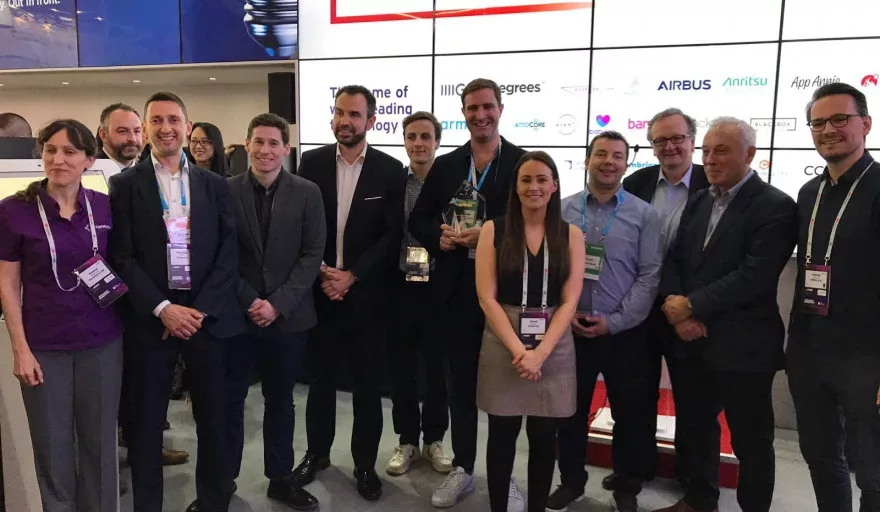MWC is not just about the world’s tech giants showcasing their latest inventions. A short, but traffic-laden trip up the road from Fira Gran Via is Fira Montjuïc, home to 4YFN (Four Years From Now) and a hive of energetic startup companies looking to become the next unicorns. In and amongst the bustle we found Patrick Imbach, Head of KPMG Tech Growth, the auditing giant’s innovative startups practice.
“The bottom line is startups are relevant players nowadays,” he tells us, “and from my personal perspective it is much more exciting to be working with them as they get stuff done, are agile and exist to solve problems. The corporate environment is less agile and can be a bit painful at times.”
KPMG, itself very much in the corporate realm, has been Imbach’s professional home for 15 years.
“At the beginning startups didn’t really feature on our radar,” he continues. “More recently we have seen the very topical, timely things that these companies are doing – the Ubers and Facebooks of the world have shown us how fast startup technologies and ideas can spread.”
For an idea to become a worldwide reality, it takes a great deal of entrepreneurial spirit, dedication, sometimes luck and access to an audience of industry peers and potential investors.
Part of KPMG Tech Growth’s remit is to provide a platform for such innovation.
“Our role is to identify interesting concepts and ideas and make sure others get to know about them,” says Imbach, trying to cut through the intermittent feedback of an erratic nearby speaker.
“On the more boring side of things, there are technical ways we can assist, such as in the UK with various tax credits which can help put cash back into entrepreneurs’ pockets.
“We can also help with raising venture capital. Startups often need quick entry to market and KPMG has a strong network of investors that can be tapped into to help these businesses finance the first steps before they generate their own revenue.”
Imbach’s main responsibility at 4YFN is KPMG’s Best British Tech Startup 2019 award.
Now in its fifth year, the competition saw KPMG whittle down more than 180 applications to find five innovative businesses from regions across the UK to pitch their business to a panel of industry experts.
“This competition is a great chance for startups to showcase themselves to the massive audience here at MWC and 4YFN,” explains Imbach, the background noise returning to normal.
“The diversity of the five finalists in this competition speaks to the UK’s vibrant tech startup ecosystem and the disruption that they are bringing to a host of traditional sectors.
“Sometimes it is difficult to differentiate from the crowd, and because smaller, younger companies cannot always draw on a long track record like many established companies, awards like this really help add to credibility and entice investors.”
Eventual investors may well take the form of multinational giants, who themselves are paying increasing attention to events unfolding at 4YFN.
And it is on this note that our quickfire conversation wraps up, Imbach concluding: “This is my fifth MWC and in the past there used to be a clear divide between corporates and startups, but over time we are seeing more corporates paying greater attention to this event.
“Big companies like Google, Daimler and British Airways have stages here. They are realising that startups are increasingly relevant to them, that they are a source of innovation and agility and can do things that their own structures may not enable.”
Best British Tech Startup 2019 – the final five
Eventual competition winner Hummingbird Technologies is an artificial intelligence business, using imagery and data analytics from UAV, satellite and plane technology, together with machine learning and computer vision techniques, to provide farmers with high resolution crop maps.
Based in London, ZigZag Global is a software solution to help ecommerce retailers manage returns domestically and globally.
Grid Edge is an artificial intelligence startup company that provides AI software services to commercial building operators to empower them to intelligently optimise their building’s energy profile, and become active and empowered participants in the energy system.
Manchester-based Optalysys is developing optical AI systems designed to accelerate the most demanding deep learning and pattern recognition tasks at groundbreaking speeds, but at a fraction of the energy consumption of traditional computing hardware.
Oxford Space Systems (OSS) is an award-winning space technology business that’s pioneering the development of a new generation of deployable antennas and structures for the global satellite industry.



















